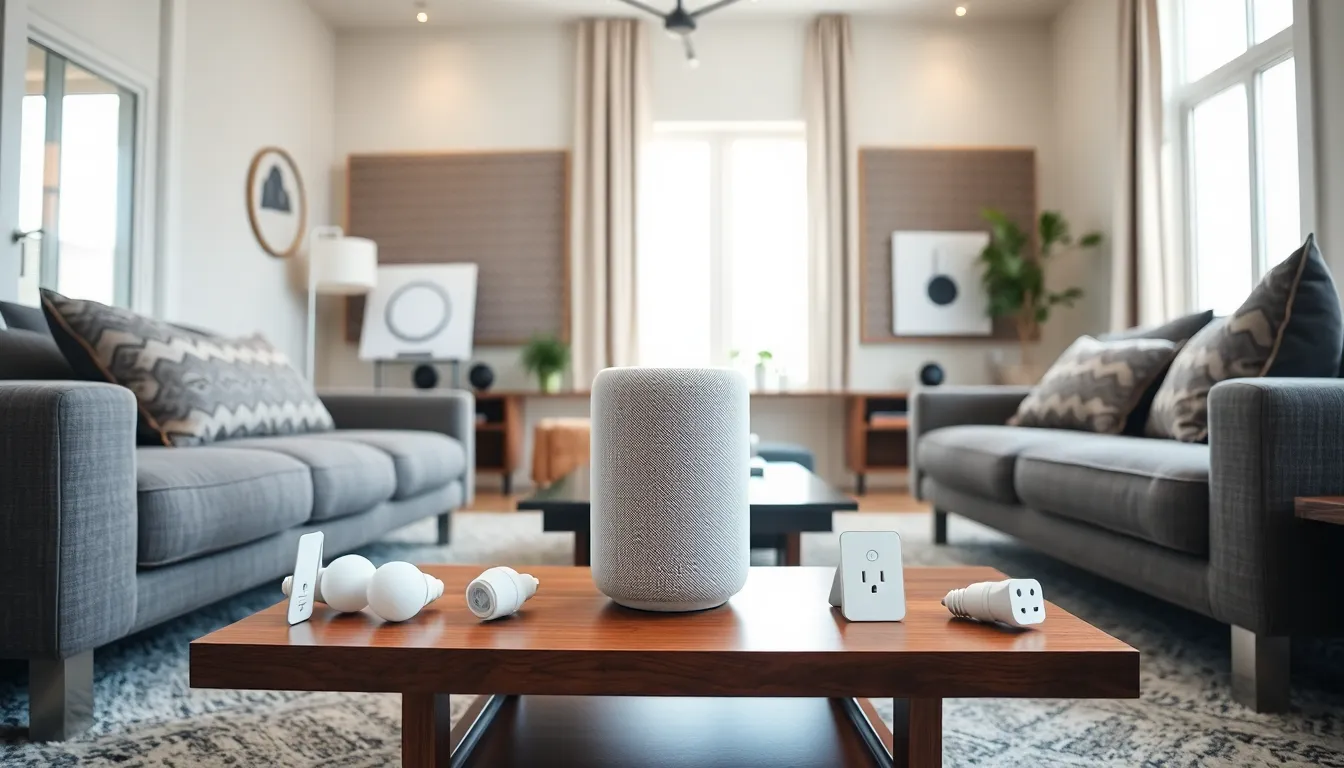Imagine strolling through your home and plucking fresh basil for your pasta or snipping a sprig of mint for that perfect mojito. With smart indoor gardens, this isn’t just a dream; it’s a reality that fits right on your kitchen counter. These clever little setups combine technology and nature, making it easier than ever to grow your own herbs, veggies, and even flowers, all while you binge-watch your favorite series.
Table of Contents
ToggleOverview of Smart Indoor Gardens
Smart indoor gardens incorporate advanced technology to facilitate plant growth within homes. Automation features streamline watering, lighting, and nutrient delivery, ensuring optimal growth conditions for herbs, vegetables, and flowers. Various models exist, catering to different space sizes and user preferences.
Hydroponic systems eliminate the need for soil, promoting faster plant growth. Some gardens utilize LED grow lights, mimicking natural sunlight, which enhances photosynthesis. As a result, users enjoy healthier plants and higher yields.
Users can monitor their gardens remotely through smartphone apps. These applications provide real-time updates on plant health, customizable settings, and reminders for maintenance. Simplifying gardening tasks encourages even novice growers to participate without the stress of traditional gardening.
Many models are compact, making them suitable for kitchens, small apartments, and office spaces. Aesthetically pleasing designs blend with home decor, adding greenery without compromising space. Accessibility to fresh produce cultivates a sustainable lifestyle and promotes healthier eating habits.
Experts suggest that engaging in indoor gardening can enhance mental well-being. Connecting with nature, even indoors, provides a sense of accomplishment and relaxation. As smart indoor gardens increase in popularity, they represent a growing trend towards sustainable living and innovation in urban spaces.
The convenience offered by these gardens allows for year-round gardening regardless of outdoor conditions. Enthusiasts appreciate the ability to enjoy fresh, homegrown ingredients regardless of season, making these systems a smart choice for many households.
Benefits of Smart Indoor Gardens
Smart indoor gardens provide numerous advantages for urban dwellers looking to grow plants conveniently at home.
Space Efficiency
Compact design makes smart indoor gardens ideal for small living spaces. They fit seamlessly on kitchen countertops, shelves, or even windowsills. Many models utilize vertical space, maximizing growth potential where traditional gardening might not be feasible. Indoor gardens often include features like stacking systems or modular units, allowing customized configurations. Given their compact nature, these gardens free up outdoor space while requiring limited square footage. Smart gardens also offer aesthetically pleasing options that blend with home decor, enhancing any room’s look.
Improved Plant Care
Automated systems in smart indoor gardens ensure optimal plant care with minimal intervention. Sensors monitor light, moisture, and nutrient levels, adjusting conditions for ideal growth. Automated watering systems deliver precise amounts of water, reducing the risk of over or under-watering. Many app integrations allow users to receive notifications when adjustments are necessary, ensuring plants thrive effortlessly. Additionally, LED grow lights promote photosynthesis, leading to healthier plants even in low-light environments. Overall, smart indoor gardens simplify the growing process, making it accessible for beginners and experienced gardeners alike.
Types of Smart Indoor Gardens
Smart indoor gardens come in various types, each designed to suit different preferences and spaces. Understanding these options helps users make informed choices about their indoor gardening experiences.
Hydroponic Systems
Hydroponic systems operate without soil, using nutrient-rich water to promote plant growth. This method encourages faster growth rates by enhancing nutrient availability. Nutrients dissolve in water, allowing plants to absorb them more efficiently. Many hydroponic systems are fully automated, controlling lighting, pH levels, and moisture. Users can expect minimal maintenance thanks to built-in sensors that monitor essential parameters. Some popular hydroponic designs include vertical towers and deep water culture setups. These systems often demonstrate higher yields compared to traditional methods, making them ideal for urban gardeners seeking quick results.
Soil-based Systems
Soil-based systems utilize traditional soil mixtures, providing a familiar gardening experience. These systems typically incorporate smart technology to manage watering and lighting, ensuring optimal growth conditions. Soil naturally supplies nutrients while offering a habitat for beneficial microorganisms. Users can choose from a range of containers, including pots and raised beds, to suit their available space. Many soil-based smart gardens feature integrated monitoring systems that alert users about moisture levels and nutrient requirements. These setups cater to both beginners and experienced gardeners by combining the benefits of soil gardening with modern automation. Flexibility in design allows for a wide variety of plant choices, enhancing the indoor gardening experience.
Key Features to Consider
Smart indoor gardens offer various features that make gardening efficient and enjoyable. Understanding these elements enhances the overall gardening experience.
Automation and Sensors
Automation simplifies plant care by managing essential tasks like watering and nutrient delivery. Sensors track moisture levels, temperature, and light exposure, creating optimal growth conditions. Users appreciate systems that automatically adjust to each plant’s needs. Access to real-time data through apps helps maintain ideal environmental factors. Some models even send alerts for necessary interventions. This technology minimizes time spent on maintenance, making gardening accessible for everyone.
Lighting Systems
Lighting plays a crucial role in plant growth, especially in indoor environments. Many smart gardens utilize LED grow lights, which provide the ideal spectrum for photosynthesis. Adjustable light schedules cater to various plant types, ensuring each receives appropriate exposure. Some systems mimic natural sunlight cycles to enhance growth. Users often benefit from energy-efficient options that lower electricity costs while promoting robust plant development. These advanced lighting setups make it possible to grow a wide range of herbs and vegetables successfully.
Popular Smart Indoor Garden Products
Several smart indoor garden products stand out in the market, catering to various needs. The Click and Grow Smart Garden 9 utilizes a soil-less growing system, allowing for easy planting of herbs and vegetables with minimal effort. Users appreciate its self-watering feature and built-in LED lights, providing the perfect conditions for growth.
Another noteworthy option is the AeroGarden Harvest, which employs hydroponic technology. This system grows plants without soil, using nutrient-rich water. With an automatic lighting system and an easy setup process, it appeals to both beginners and seasoned gardeners.
For those looking for a stylish addition to their home, the Veritable Smart Indoor Garden offers an elegant design. Equipped with smart grow lights and a self-watering feature, it makes maintaining a garden hassle-free. It includes pre-seeded pods, allowing users to start growing herbs like basil and mint quickly.
In addition, the GardenCity Smart Indoor Garden targets urban dwellers with limited space. Its vertical design maximizes growing area and incorporates automation for watering and light cycles. Users value the app connectivity that tracks growth and sends reminders for maintenance.
Lastly, the Smart Garden 3 showcases simplicity and functionality. With its compact design, it’s suitable for kitchens and small apartments. This product also features an automatic watering system and LED lights, enabling stress-free gardening for everyone.
Each of these popular smart indoor garden products demonstrates the integration of technology with nature, making home gardening achievable for all. They provide a variety of options tailored to different user preferences, promoting a healthier and more sustainable lifestyle.
Smart indoor gardens are revolutionizing the way individuals approach home gardening. By combining technology with nature these innovative systems provide an effortless way to grow fresh produce and enhance living spaces. The convenience of automation and app integration allows users to cultivate plants with minimal effort while enjoying the benefits of fresh herbs and vegetables.
As urban living continues to rise smart indoor gardens offer a sustainable solution for those with limited space. Their compact designs and efficient growth systems make them ideal for any environment. With their ability to promote mental well-being and healthier eating habits these gardens are more than just a trend. They represent a shift towards a greener lifestyle that anyone can embrace.








